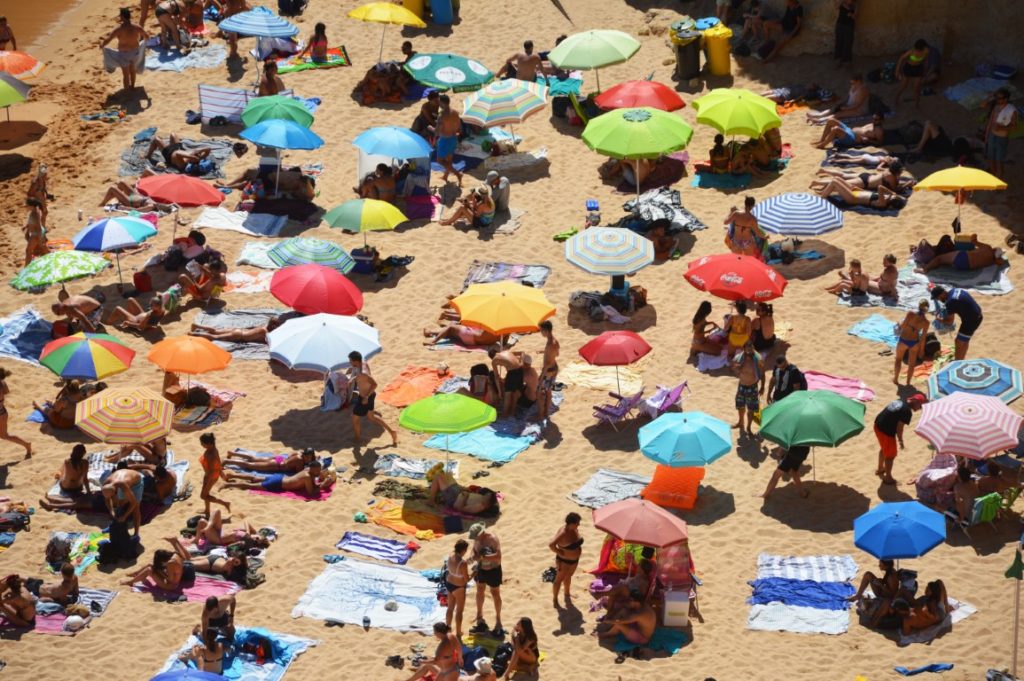The Algarve is the most important tourist destination in the country, an activity that has been explored based on the product of sun and sea. This, in turn, gave rise to the situation of extreme economic dependence on tourism and had as a consequence a high seasonality in the region.
According to INE, in 2017, the Algarve's regional Gross Domestic Product (GDP) amounted to 9014,995 million euros and the regional Gross Added Value (GVA) reached 7812,127 million euros. In terms of wealth generated, in 2017, the Algarve represented 4,6% of the national GDP and the GDP per capita amounted to 20,463 thousand euros. In 2017, labor productivity in the Algarve reached 36,914 thousand euros.
According to INE, in 2017, the active population in the Algarve was 229 thousand people. Of these, 211,5 corresponded to the employed population and 17,6 thousand to the unemployed population, which generates an unemployment rate in the Algarve of around 7,7%. In the region, 170,6 thousand people were employed (ie, 80,7% of the total number of people employed in the Algarve) with 120,4 thousand having a permanent employment contract (ie, 70,6% of the total number of employees). In the Algarve, 39,2 thousand people were self-employed (ie, 18,5% of the total number of people employed in the region).
Comparing with the values for Mainland Portugal, it appears that there are differences. In 2017, the active population numbered 4964,6 thousand people. Of these, 4526,5 thousand were employed and 438 thousand were unemployed, so the unemployment rate in Mainland Portugal stood at 8,8%. Among the employed people, there were 3756,4 thousand who worked for others (ie, 82,9%), and 2930,8 thousand had a permanent employment contract (ie, 78%). Of those with employment, 749,7 thousand people were self-employed (ie, 16.6%).
There are also relevant differences in the income level of employees in the Algarve compared to the rest of the country. The average monthly earnings of employees in the Algarve, in 2017, amounted to 942,73 euros and in Mainland Portugal reached 1107,86 euros, ie, a negative difference of 165,13 euros per month.
The average monthly earnings of workers with secondary education in the Algarve amounted to 953,08 euros and in Mainland Portugal it reached 1068,65 euros (less 115,57 euros per month). Graduates earned 1415,76 euros, on average, in the Algarve and in Mainland Portugal earned 1813,61 euros (less 397,85 euros per month).
The average monthly earnings of workers with a master's degree was €1446,64 in the Algarve and in Mainland Portugal it reached €1764,07 (€317,43 less per month). Doctorates earned 2194 euros, on average, in the Algarve and mainland Portugal earned 2573,30 euros (less 379,30 euros per month). Interestingly, the average monthly salary of unskilled workers was 717,40 euros in the Algarve and 707,94 euros in mainland Portugal (an additional 9,46 euros per month).
The statistics are interesting, but they always fall short of everyone's personal stories. In fact, as a young woman who has reached a high level of qualification, I face difficulties in finding a professional challenge in my training area. I finished my degree in the most complicated period in accessing the labor market, which coincided with the peak of the crisis in Portugal.
However, today, as a master, I still have no professional experience in the area in which I graduated. This is a big hurdle I face. I see that I have fewer and fewer opportunities to find a professional challenge that interests me in a job market that is increasingly globalized and competitive.
Unfortunately, I see that the job market is less and less interesting in the region, which leads many to accept working in things of no interest to those who graduated, accepting little or, worse still, finding themselves in the contingency of leaving the region (and the country) to have access to what they always dreamed of.
Is this the future we want for the Algarve and the country? It is worth reflecting on the topic.
Author: Ana Correia is an Algarvian of gem and with great pride. He is an effective member of the Order of Economists.
She has a degree in Economics from the Lusófona University of Humanities and Technologies of Lisbon and a Master's Degree in Business Finance from the Faculty of Economics of the University of Algarve, both of which earned her enrollment in the Portuguese Economists.
She is considered passionate about life, the Algarve and travelling. And, of course, she is a fierce Sportinguista.
Note: article published under the protocol between the Sul Informação and the Algarve Delegation of the Order of Economists



















Comments